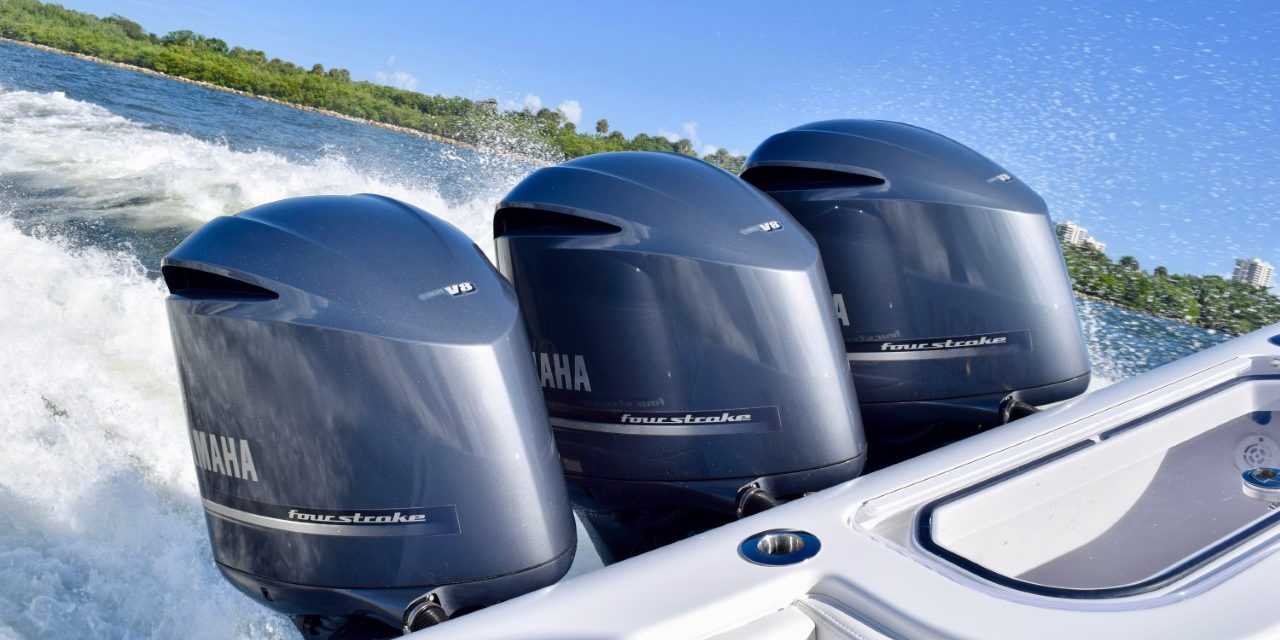As a luxury sportfish yacht and outboard boat brokerage serving South Florida for over 20 years, we’ve received a lot of great questions about boat purchases. One question we occasionally hear from our Evolution customers is: “When I buy a boat or tender from you, can I separate the engines from the hull for tax purposes?”. As a dealer, we cannot separate the engine from the hull. In fact, we are required by the state of Florida to collect sales tax on the full purchase price of the vessel.
Inboard engines on yachts or sportfish boats are always included in the full purchase of the vessel and can never be separated or itemized on a bill of sale. However, this does bring up some interesting questions about Florida sales tax law and outboard engines, along with ways that our customers may be able to maximize their tax savings.
Below we will outline the current Florida sales tax law, as it relates to outboard boat purchases for dealers and private sellers, and hopefully, bring some clarity to this often confusing topic.
An Overview of Florida Sales Tax Law
To start with, under the laws of the Florida Department of Motor Vehicles (DMV), every car/boat/plane must be registered with the DMV. With that in mind, the DMV is the entity responsible for ensuring that all motor vehicles are properly registered with the state and that sales tax and registration fees have been paid. If you’ve ever purchased a boat through a licensed dealer, you’ve likely never had to deal with the DMV until you paid your registration renewal fee (which is usually done by mail or online). That’s because the dealer collected and paid sales tax on your purchase.
Whether you purchase a boat from an individual seller or a licensed dealer, you are required to pay sales tax on the purchase price. But does that mean the sales tax law is the same in both instances? Not always!
There is an interesting twist in the law. In some cases, boats with outboard motors can be potentially taxed differently, specifically when the two are listed separately on the bill of sale. Below we’ll go into detail on how this works.
When You Purchase from a Dealer
When you decide to purchase a vessel from a dealer, they are required by law to collect sales tax on the whole purchase price of all tangible personal property sold to you. The Internal Revenue Service may audit the dealer and hold the dealer responsible for the sales tax if such amounts are not collected from you at the time of sale. The DMV, on the other hand, has a more limited scope in what they are allowed to tax. This offers a unique potential for tax savings for those purchasing from a private seller.
The bottom line: When you purchase a boat from a licensed dealer, you can expect to pay full sales tax for all items purchased at the time of sale.
When You Purchase from an Individual
If you opt to purchase a boat from a private or individual seller, you’ll find that for any purchase you make – whether it’s the boat, outboard motors, marine electronics etc. – the seller does not have to collect sales tax from you on any of these items. You, however, as the buyer are required to take the bill of sale over to your local DMV office and pay the sales tax directly to the DMV. The DMV is only required to collect sales tax on the vehicle (boat, car, etc.) that is required to be registered. In the state of Florida, engines are not required to be registered or titled. Any separately itemized goods (engines, life jackets, tackle, spare parts, etc) reflected on the bill of sale that is not the vehicle or boat hull the DMV is not required to or allowed to tax. So, at the end of the day, you’ll only pay tax for the hull of the boat to the DMV, not the engines or any accessories in the sale.
The Concept of Use Tax
The idea of use tax is important to mention. If you make a purchase online and the seller does not collect sales tax, you are actually supposed to remit the sales tax to the state yourself. This is called a Use Tax and it is sent out via a form called the DR-15MO (“MO” meaning mail order). You can find this form here on the Florida Department of Revenue website (https://floridarevenue.com/Forms_library/current/dr15mo.pdf). This form is useful when you are purchase non-vehicle itemized items (also subject to tax just like your online purchases).
Final Thoughts on Sales Tax Law
It’s important to note that with all this information, there’s a great opportunity for some tax planning for potential savings. If you happen to buy a boat with a high-priced outboard motor from a non-dealer, then be sure to ask the seller to separately itemize the motor (with the price listed) on the bill of sale. On that same note, because you are purchasing through a private seller, you have some flexibility in allocating the price between the boat and the motors. This can work to your advantage for additional tax savings. Keep in mind that all allocated values must be reasonable and honest.
We want to reiterate that paying taxes to the DMV is REQUIRED and an important responsibility. If you do not feel comfortable handling this task on your own, we recommend using a licensed dealer to handle the sale for you as you will not be able to title or register your boat in your name until taxes are paid. In the future, when you are ready to sell the vessel, you will not be able to transfer ownership to the next buyer until taxes are paid and the boat’s title and registration are in your name.
To sum up the concepts, you can expect to pay sales tax in its entirety when you purchase your boat from a licensed boat dealer (like MacGregor Yachts and Evolution). By law, a licensed dealer must collect sales tax on the full purchase price of the vessel (and they cannot split or remove itemized parts to adjust sales tax). If you opt to purchase from a private seller, you can separate and put a value on the motor and/or other accessories on the bill of sale to be taxed solely on the hull, if you wish to do so. There’s also some flexibility in how you structure the price between the boat and motor for additional tax savings. Ultimately, with the right planning and tax know-how, you can expect some sales tax savings on your boat purchase.
Again, paying taxes to the DMV is an extremely important responsibility. If you do not feel comfortable handling the paperwork and DMV visit, we recommend using a licensed dealer to do it for you. Hopefully, this article has helped clear up your options when it comes to tax savings during a boat purchase.
If you’re considering purchasing a boat, MacGregor Yachts is your first step. Give us a call to get in touch with our knowledgeable and friendly team at (561) 799-6511 or contact us through our website. We can help clarify the existing tax laws and point you in the right direction!
Additional resources:
https://www.flhsmv.gov/motor-vehicles-tags-titles/vessels/
https://www.boats.com/boat-buyers-guide/boat-taxes-basics/
https://floridarevenue.com/Forms_library/current/gt800005.pdf
https://legalbeagle.com/6894531-florida-boat-sale-laws.html
Ready to make a boat purchase but unsure of the tax laws? Call MacGregor Yachts today at (561) 799-6511 or contact us through our website and we’ll help you navigate!








